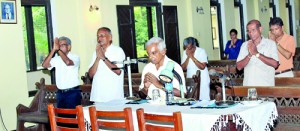A spiritual escape
It is early Saturday evening and the Galle Road at Bambalapitiya is a comfortable cacophony of weekend activity but a turn into Lauries’ Road, finds the Mettaramaya; an escape from the noisy sights and sounds. The temple this evening is a peaceful hum of activity as a few individuals make their way past the stupa to the back, where stands a chapel- a building one would hardly expect to see in a temple.

Peaceful: Maitri Hall in Mettaramaya temple. Pic by Anurada Bandara
If such a sight caused surprise in the mind of the casual observer, it clearly didn’t bother the men and women who removed their shoes at the entrance and stepped inside; a practice that has been taking place for close to a century as they prepared for the weekly meeting of the society of ‘The Servants of the Buddha’.
“In my personal view it goes to real Buddhist philosophy,” explains Mrs. Jayakuru who had joined the society in the early 90s. More of a forum rather than a typical “bana” or sermon, meetings take place every Saturday at 4.30 p.m. “We go through the minutes of the previous session and then meditate for about five minutes,” clarifies Dr. Kosala De Silva, President of the society. A guest speaker either from the clergy and laity conducts the session. For the members, it is comprehensive and allows them to question the Dhamma and share their views and opinions- all in English.
With a history that has witnessed many events such as birth of the country’s independence and two world wars, the walls of the Maitri Hall, as the chapel is known have always provided its visitors with a spiritual escape while offering them the freedom and liberty to examine Buddhism from a layman’s point of view.
Established almost 40 years after the acclaimed publication “The Light of Asia” by Sir Edwin Arnold, KCIE CSI, the study of Buddhism in English built a bridge between the East, the West and Buddhism. With interest in the doctrine spreading across America and Europe over the next few decades, an Englishman- Allen Bennet was ordained as a Bhikkhu in Ceylon, believed to have been only the second Englishman to take the robes. As Ven. Ananda Metteyya, he had a vision of teaching the Dhamma in English especially in Anglicised schools as Buddhism was not part of the school curriculum at that point.
Having heard Ven. Ananda give a sermon, Dr. Cassius A. Pereira, LMS (Cey), LRCP (Lond) embraced Buddhism. Ordained as Bhikkhu Kassyapa of the Vajiraramaya Temple, he worked diligently toward the spread of the Dhamma and together with Ven. Rambukwelle Siddhartha Thera , Ven Narada Maha Swaminwahanse and a few others formed the Servants of the Buddha Society in 1921, becoming its first president.
Since its inception the society has attracted the clergy and laity, scholars and even those of different faiths.
Over the years little has changed within the society. The medium of communication remains English. In fact the Servants of the Buddha is believed to be one of the only Buddhist societies in Sri Lanka to conduct their meetings exclusively in English. While introducing Buddhism to schools was a primary objective, Dr. De Silva believes that conducting sessions in English may have been done to create a sense of familiarity among English speaking Colombo of the colonial ’20s.
Another, if not the most atypical feature of the society is in the hall itself. The Maitri Hall located at the back of the Mettaramaya with long open doors familiar to a classical church building, has a chapel-like atmosphere, complete with a high ceiling, pews and even an altar. Softly lit, one feels quite at home seated in one of the pews, feet touching the cold cement floor. The building is rustic and simple. A small vestry of sorts adjoins the hall, where two cupboards make up the humble ‘library’ with books dating back to the last century. “The building itself captures attention,” adds a member, and yes, it is in need of repair.
For Dr. De Silva little has changed since he can remember. Although he joined only about three and a half years ago the Servants of the Buddha is a society linked to him from his childhood. “My father used to come for meetings, even from Panadura,” he reminisces.Having attended Dhamma school as a child, his father’s spiritual influence was deeply rooted within young Kosala, who would later on become a keynote speaker at many a meeting, before becoming a member, and more recently the society’s president.
Mrs. Jayakuru joined the society during her late husband‘s period as President. “We have a lot of professionals- lawyers, doctors, engineers, even naval officers,” she explains, as to the diverse group of people who make their way to the Maitri Hall with a thirst of knowledge and maybe even inner peace.
Retired teacher Badra Yatamagamuwa who has been attending meetings for the past 30 years still doesn’t call herself a member per se. She comes for the opportunity to listen and learn, she says, and some speakers go “straight to the heart”.
The weekly meetings attract around 20 to 25 people, while they do see bigger crowds especially young people coming in on Vesak poya day.
On the last Saturday in July when the Sunday Times dropped in, the meeting was devoted to one and a half hours of meditation. Not everyone was able to remain in full concentration, and some waited till the end to ask questions and discuss their own doubts with Prof. Rajah De Alwis, the guest speaker for the day. All in an atmosphere of calm that seems to characterise the society.


